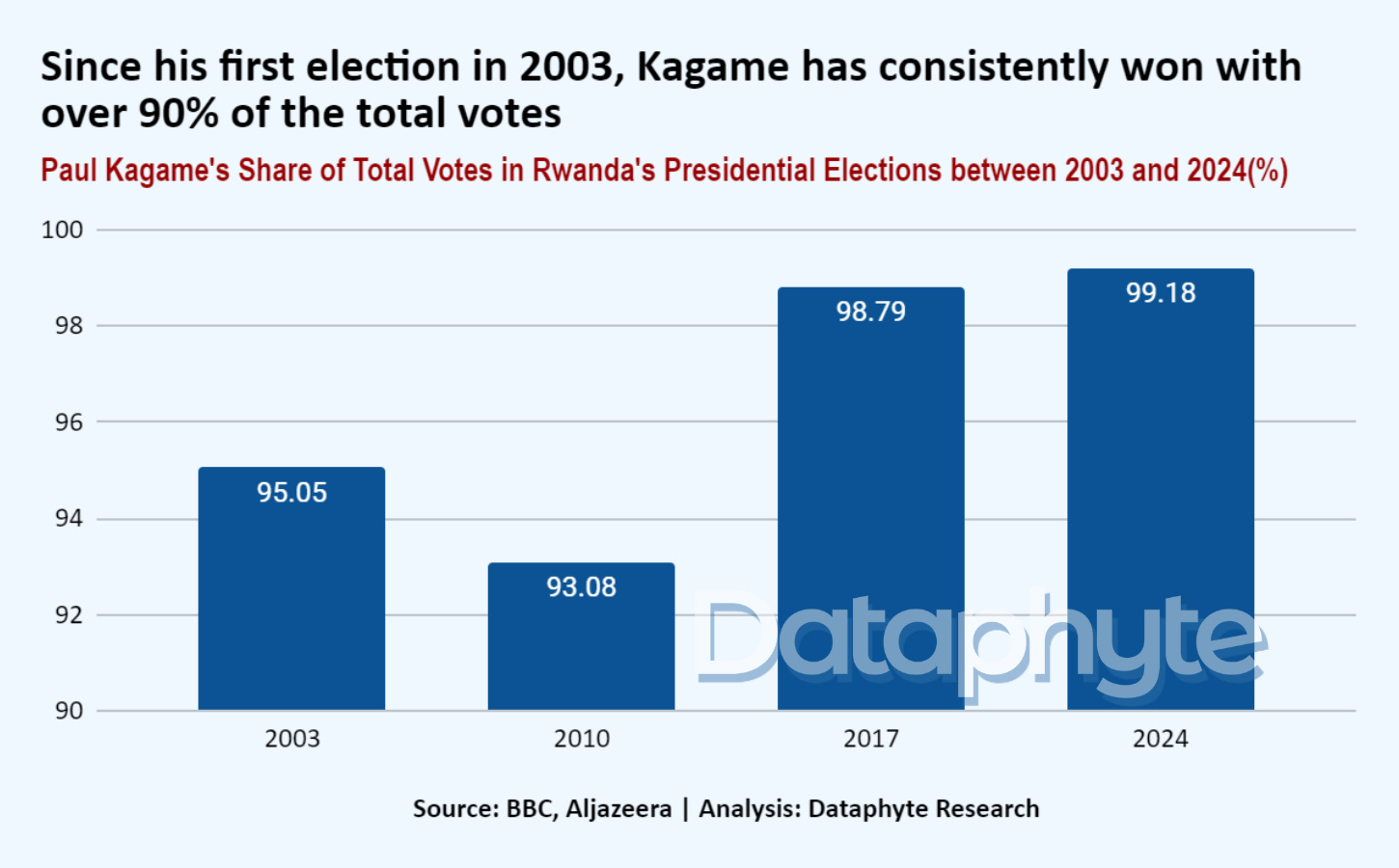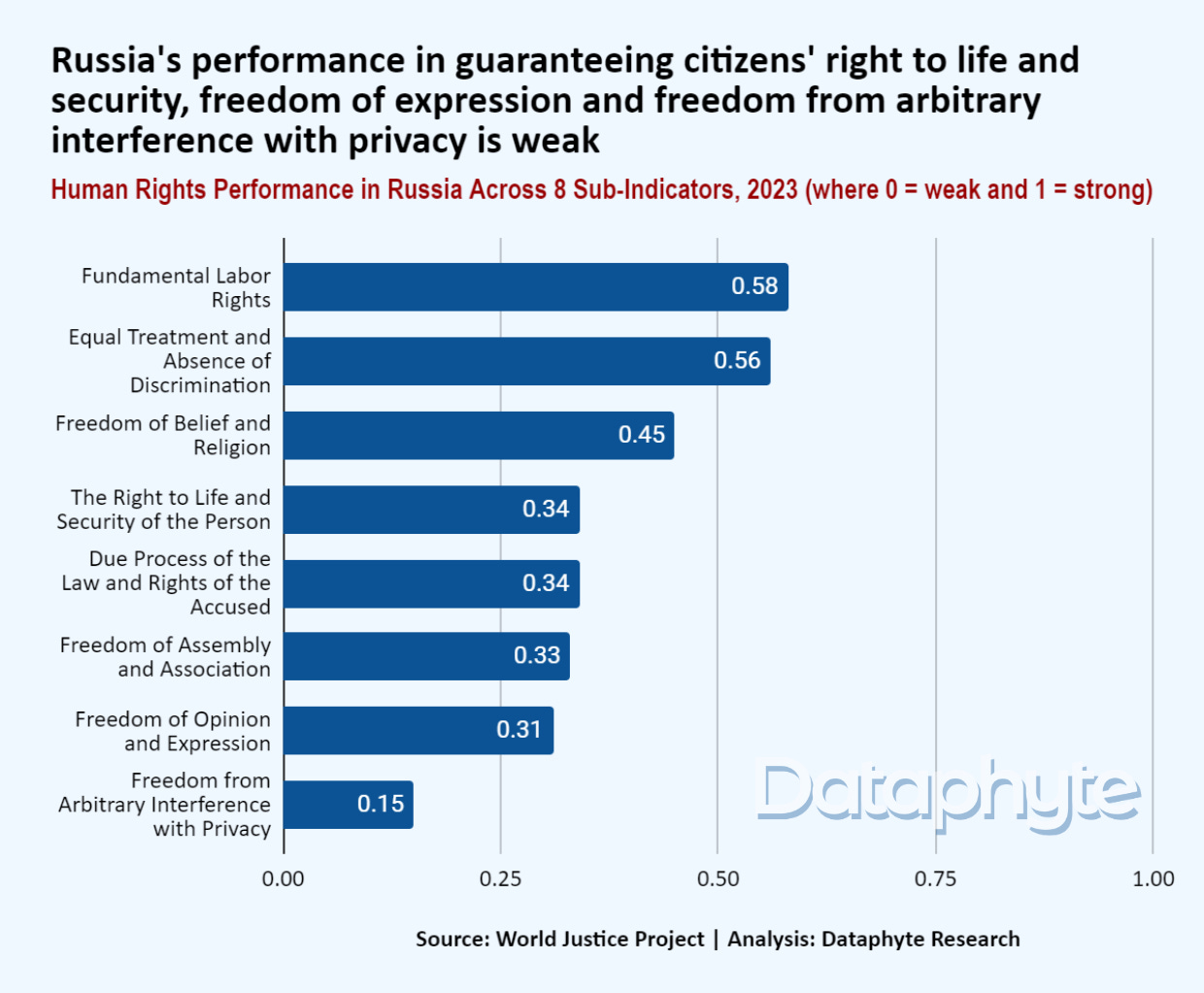Paul Kagame, the President of Rwanda, won a sweeping triumph in the country’s 2024 presidential election held on July 15, securing a 4th term in office with 99.2% of the total votes against his opponents.
This victory reinforces Kagame’s hold on power and asserts his right to be there, echoing a familiar tale of power's seductive allure.
Earlier in March, and in a context much alike, Russia's President, Vladimir Putin, won a landslide victory, being re-elected for a 5th term with over 87% of the votes.
In both regimes, the authorities have stifled voices of dissent and relegated all semblance of political opposition to the shadows of fear and fiery reprisals.
In the 2024 Elections provisional results released by Rwanda’s electoral agency, Paul Kagame’s two opponents, Frank Habineza of the Democratic Green Party of Rwanda and independent candidate Philippe Mpayimana, both garnered less than 1% of the total votes.
However, a Human Rights Watch on the political space in Rwanda put it that:
“Opposition parties in Rwanda face administrative obstacles to registration and political pressure to toe the government line. Over a dozen political opposition members are in prison and, in many cases, they are being prosecuted or have been convicted on spurious grounds.”
This explains Kagame’s victory margin in the 2024 presidential election with no serious competition, as in the past elections.
Paul Kagame first came to power after leading the rebel, Tutsi-led Rwandan Patriotic Forces, which seized power from the Hutu government, ending the 1994 genocide that killed 800,000 to 1 million Tutsis and moderate Hutus.
Kagame was considered the de facto leader as vice president from 1994 until 2000, when he became president, after his predecessor, Pasteur Bizimungu, resigned.
He won the first democratic election that brought him to power in 2003 and was re-elected in 2010 and 2017 for a second and third seven-year term each.
Since his first election in 2003, Kagame has invariably won with over 90% of the total votes, with his 2024 vote share being the highest in the last 4 presidential elections.
In 2015, Rwandans voted in a referendum to remove the two-term limit for the presidency and shorten the term length from seven to five years.
The report reads, “Rwanda’s National Electoral Commission has announced the provisional results of the referendum that show the majority have voted for an amendment to the constitution to allow the president to potentially extend his rule.”
“Voters overwhelmingly backed a referendum that provides President Paul Kagame with the opportunity to stay in office until 2034.”
This means following the 2024 election, Kagame will be eligible to run for another two five-year terms and potentially remain in power until 2034.
Russia’s Putin too enjoys Kagame’s kind of right to be there.
Putin’s new term in the March 2024 presidential election doesn’t expire until 2030, and he will be constitutionally eligible to run for office even then.
In March, Putin was re-elected to a 5th term in a tightly controlled election from which two candidates, who are critics of the ongoing war in Ukraine, were excluded on technical grounds. His most prominent rival, Alexei Navalny, died unexpectedly in an Arctic penal colony, while other major critics were imprisoned or forced into exile.
This pattern of prolonged rule and constitutional adjustments to extend the incumbent’s tenure are characteristic of most authoritarian states, where leaders often deploy all means, including legislative fiat, to retain power.
While Rwanda’s Paul Kagame is credited with rebuilding a traumatised nation after the 1994 genocide, he is also accused of stirring instability in the Democratic Republic of the Congo (DRC) for the alleged role of the Rwandan Defence Force (RDF) in the eastern DRC conflict, including direct actions and support to the M23 armed group.
Similarly, Russia’s full-scale invasion of Ukraine in 2022 created a sphere of terror and instability in the country.
The enduring autocratic rule and alleged abuse of power in Rwanda and Russia have only imperiled citizens’ freedoms.
The Freedom in the World Index 2024 reveals that the dangers posed by authoritarian aggression, such as violent attacks and state-sponsored conflicts, have rendered the world unsafe and undemocratic, causing a significant decline in global freedom throughout 2023.
Notably, political rights and civil liberties diminished in 52 countries, with only 21 countries making improvements.
The global decline in human rights is due to the poor records in countries like Rwanda and Russia, who fall significantly below the world average freedom score, highlighting the difficulty citizens face in fully exercising their fundamental rights.
In the 2024 Freedom in the World rating, Rwanda was classified as “Not Free” with a measly freedom score of 23 out of 100.
In 12 years, Rwandans struggled with an average freedom score of 23. This statistical portrayal of the dismal condition of citizens’ civil and political liberties in the country was captured in the Human Rights World Report 2023.
“The ruling Rwandan Patriotic Front (RPF) party continued to wage a campaign against real and perceived opponents of the government. Critics, including internet bloggers and journalists, were arrested, threatened, and put on trial. The authorities rarely investigated enforced disappearances or suspicious deaths. Arbitrary detention and ill-treatment in unofficial detention facilities were common, especially around high-profile visits,” the Report read.
Similarly, in Russia, citizens' freedoms — including the quality of the electoral process, political participation, freedom of expression and belief, and rights to association and organization — are gradually fading away, due to the government’s repressive techniques.
A more notable decline was recorded in Russia’s freedom score after its invasion of Ukraine in 2022.
Hitherto, Rwanda and Russia are classified as authoritarian regimes evident in their featured restrictions on political opposition, suppression of free speech, and the repression of media and civil society.
In the 14-year record of the Democracy Index by the Economist Intelligence Unit, Rwanda remained an authoritarian regime with an average score of 3.2 out of 10.
In an Authoritarian regime, civil liberties abuses are often ignored, with media either state-owned or controlled by entities affiliated with the ruling regime. Criticism of the government is suppressed, censorship is widespread, and there is no impartial judiciary.
Most times, certain decisions and actions under an authoritarian rule are detrimental to the overall respect for core fundamental human rights such as the right to life and security of the person, freedom of expression and the press, right to equal treatment et cetera.
According to the World Justice Report, the Rwandan government has maintained a mediocre score in core human rights in the past 5 years.
Out of the 8 sub-indicators used to measure the respect for the fundamental human rights of citizens, Rwanda scored low in the freedom of opinion and expression, the right to life, and security of the person, and the freedom from arbitrary interference with privacy.
In Russia’s case, performance in guaranteeing citizens' right to life and security, freedom of expression, due process of the law and the rights of the accused, and freedom from arbitrary interference with privacy is weaker.
While there is a general decline in respect for citizens' rights in both Russia and Rwanda, the freedom of the press and the media's right to operate independently without fear of threats are particularly compromised.
The media and journalists constantly face arbitrary arrest, attacks, and forced detention, making these regimes hostile climates to practice journalism.
In the 2023 Human Rights Report for Rwanda, there were records of arbitrary arrests of journalists.
“At the time of writing, several journalists and commentators were behind bars in Rwanda. In some cases, they were arrested for speaking out about security force abuses, including unlawful and arbitrary detention, torture, and extrajudicial killings, or for criticizing the ruling RPF and its human rights record. Allegations that the authorities beat or otherwise ill-treat political prisoners are common in Rwanda,“ the report noted.
Russia has also recorded an exodus of independent Russian and foreign media outlets after Russia invaded Ukraine, most of which has continued due to concerns for journalists’ security.
In terms of economic growth, Rwanda's economy has maintained fair stability. Real GDP growth stabilized at 8.2% in 2022 and 2023, driven by expansion in industry and services on the supply side and public sector expenditures on the demand side. In 2024 and 2025, Real GDP growth is projected to drop to an average of 6.6%, the 2024 African Economic Outlook showed.
However, with the suppression of voices of dissent in the civic space and opposition parties, it is difficult to ascertain the veracity or inclusiveness of economic welfare and social development.
As Sarah Repucci and Amy Slipowitz describe, authoritarian regimes have become increasingly adept at undermining or bypassing the norms and institutions designed to uphold basic freedoms.
They noted that the global order is approaching a critical point, and if efforts are not directed to ensure freedom for everyone, the authoritarian model may prevail.















It will be interesting to see what lies ahead for Rwanda. Many African states that have been under authoritarian rule, although flourishing (economy, standard of living) sooner or later begin to fall because the government of the day refuses to leave power and then with their own hands bring down all they've built. I hope Rwanda is able to have a smooth power transition in the future and does not repeat history like Libya or other countries where the leaders were authoritarian.